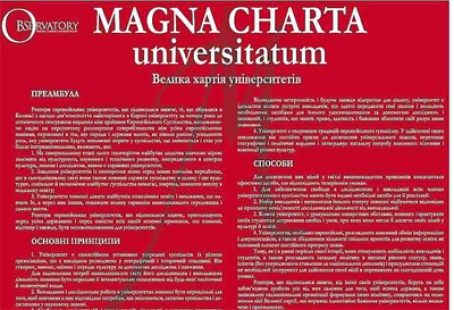Bridging the missions of universities
Learning Curve: Perspective
New Sunday Times - 30-09-2012
REVISITING THE MAGNA CHARTA UNIVERSITATUM: Make it inclusive

Currently, the document has been inked by some 750 university leaders from all over the world, and the number is said to be growing.
It seems that the document continues to be relevant to higher education institutions everywhere as its primary goal "is to celebrate the deepest values of university traditions and to encourage strong bonds among European universities".
It has also positioned itself to serve "a universal inspiration and is open to many universities around the world".
Indeed, the document is available in 50 languages. In its preamble, it puts forward three important considerations, namely:
• at the approaching end of this millennium, the future of mankind (sic) depends largely on cultural, scientific and technical development and this is built up in centres of culture, knowledge and research as represented by true universities
• the universities' task of spreading knowledge among the younger generations implies that, in today's world, they must also serve society as a whole and the cultural, social and economic future of society requires, in particular, a considerable investment in continuing education
• universities must give future generations education and training that will teach them -- and others will also learn through them -- to respect the great harmonies of their natural environment and of life itself.
The document further sets out four fundamental principles.
Firstly, the university:
• is an autonomous institution at the heart of societies differently organised because of geography and historical heritage
• produces and appraises culture by research and teaching
• must put in place research and teaching practices that are morally and intellectually independent of all political authority and economic power to meet the needs of the world around it.
Secondly, teaching and research in universities must be inseparable if their tuition is to keep up with changing needs, the demands of society, and advances in scientific knowledge.
Thirdly, freedom in research and training is the fundamental principle of university life, and governments and universities must ensure respect for this fundamental requirement.
While rejecting intolerance and always being open to dialogue, the university is an ideal meeting ground for teachers capable of imparting knowledge and well-equipped to develop it with research and innovation. Students must be willing to enrich their minds with that knowledge.
Lastly, the university is the trustee of the European humanist tradition; its constant care is to attain universal knowledge to fulfil its vocation. It transcends geographical and political frontiers, and affirms the vital need for different cultures to know and influence each other.
On Sept 21, 2012, the Magna Charta Observatory, an organisation that monitors the implementation of the Universitatum, convened its annual conference in Bologna to commemorate the 24th anniversary of the Magna Charta Universitatum and hold a Conversation On Intellectual Freedom: Magna Charta Universitatum Then and Now, where I was privileged to offer a non-European dimension to international perspectives.
I raised the point that while the three considerations clearly spelt out in the document can be regarded as universal, the four fundamental principles are not.
Foremost is the last principle that reads "a university is the trustee of the European humanist tradition" which makes it at once Eurocentric by negating other traditions associated with a university (though not called by its Latin label) in a different cultural setting. Some of these are much older than that of Bologna.
It also contradicts the first consideration which says "the university is an autonomous institution at the heart of societies differently organised because of geography and historical heritage" and not a one-size-fits-all!
It is time that the Magna Charta Universitatum is revisited and revised before it can become a truly inclusive international document that is able to bridge the diversity of meanings and missions of universities beyond just Europe, or even teaching and research for that matter.
Perhaps this is best attempted during its 25th anniversary next year. Let's take the Magna Charta Universitatum forward to meet its universal aspiration while respecting the great harmonies of life itself.
- The writer is the vice-chancellor of Albukhary International University
